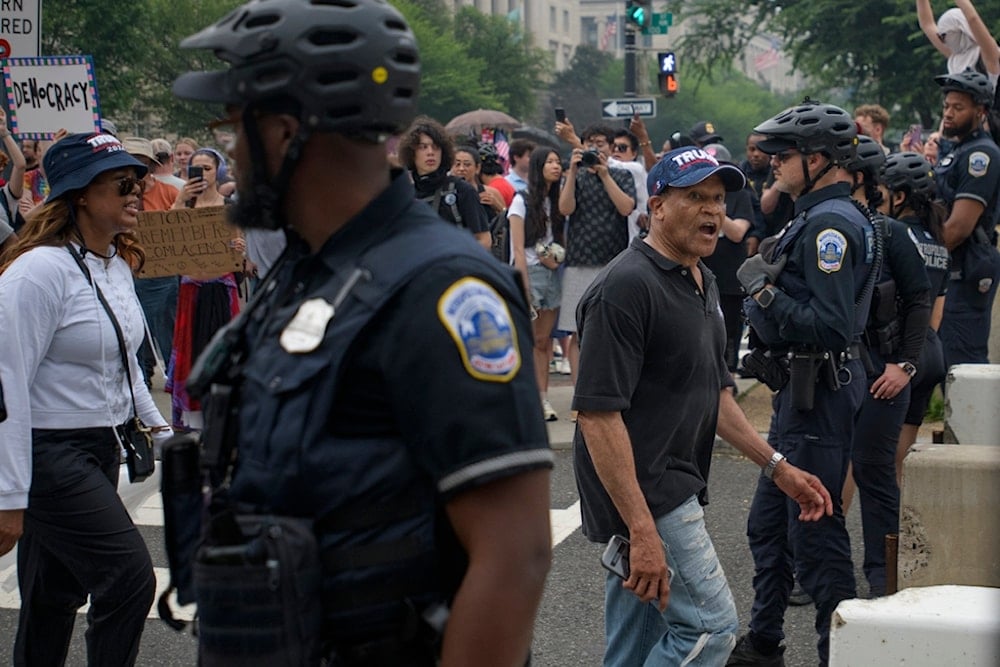Trump’s costly DC military surge burns $1M a day: The Intercept
The Intercept reveals Trump’s militarization of Washington goes beyond patrols, dragging taxpayers into funding traffic control and “beautification” at staggering costs.
-

A man walks through a buffer zone created by Washington DC Metro police during a protest taking place on the day of a military parade commemorating the Army's 250th anniversary, Saturday, June 14, 2025, in Washington. (AP)
A cost analysis by The Intercept projects that the ongoing militarization of Washington, DC, could exceed $1 million per day, potentially climbing into the hundreds of millions if extended indefinitely. The operation reportedly covers not only so-called “community safety patrols,” but also tasks such as “traffic control” and even “area beautification.”
Critics argue the initiative marks another step in President Donald Trump’s broader effort to expand federal control, calling it a push toward authoritarian governance. Trump, however, has dismissed accusations of acting like a dictator, framing the deployment as both a law enforcement operation and an urban improvement campaign.
In recent days, Republican governors from West Virginia, South Carolina, Ohio, Mississippi, Louisiana, and Tennessee have agreed to send National Guard troops to assist federal forces in DC These reinforcements will supplement nearly 900 D.C. National Guard members already activated, bringing the total to around 2,100 troops.
According to a defense official, 500 West Virginia Guard members had arrived by Monday afternoon, while 300 from South Carolina were on their way, despite the state’s governor publicly authorizing only 200.
Cost analysis and public criticism
The National Priorities Project’s Hanna Homestead estimated the deployment’s daily cost at more than $1 million. She criticized the administration, stating: “It’s unconscionable that the Trump administration would hand the military a blank check of over a million dollars a day to occupy DC while stripping access to health care and food aid from millions of families across the country.”
She further noted that the cost is “more than four times what it would cost to operate affordable housing for DC’s entire unhoused population.”
Pentagon officials maintain that they cannot provide an exact cost estimate until the mission concludes, but one defense official suggested the department likely has projections and is withholding them to avoid public scrutiny. The operation’s open-ended timeline could drive costs into the tens or even hundreds of millions, Homestead warned.
Criticism of mission justification and civil liberties concerns
Despite Justice Department statistics showing DC’s violent crime rate at a 30-year low, Trump declared a crime emergency, describing the city as plagued by “violent gangs” and “caravans of mass youth.” Critics argue the deployment is not about crime but about consolidating federal control over local law enforcement.
Hina Shamsi of the ACLU warned, “Through his manufactured emergency, President Trump is engaging in dangerous political theater to expand his power and sow fear in our communities. … Sending heavily armed federal agents and National Guard troops … is unnecessary, inflammatory, and puts people’s rights at high risk of being violated.”
The move is part of a broader trend under Trump, who has deployed tens of thousands of federal troops nationwide for various law enforcement and immigration-related missions. Legal experts warn this could violate Posse Comitatus, the 19th-century law restricting military involvement in civilian affairs, potentially exposing troops and commanders to future legal consequences.
Trump's response and messaging strategy
Trump has framed the operation as a victory, claiming residents thanked him for making DC safe again. In a social media post, he pledged to “liberate this City, scrape away the filth, and make it safe, clean, habitable and beautiful once more!”
State military officials echoed this rhetoric with softer language, emphasizing partnership and public safety. Yet, critics remain concerned about the growing use of military forces for domestic law enforcement and the staggering financial burden it imposes.

 4 Min Read
4 Min Read










